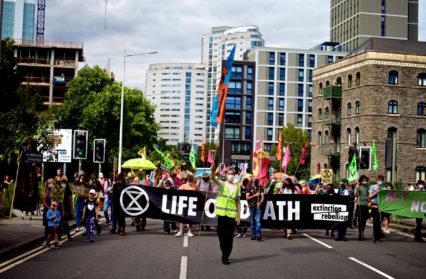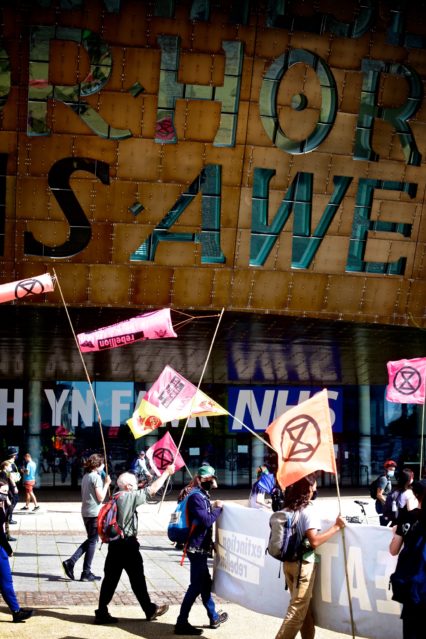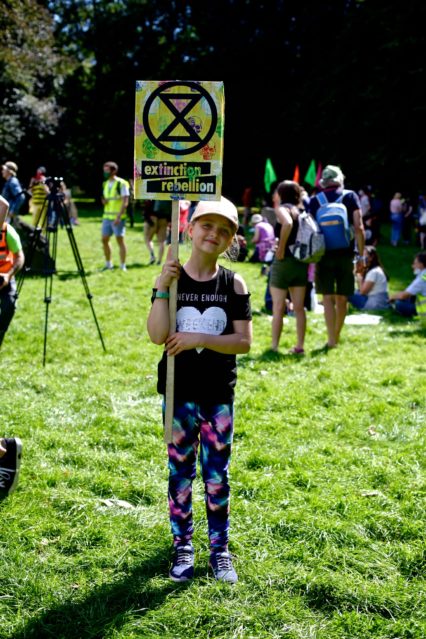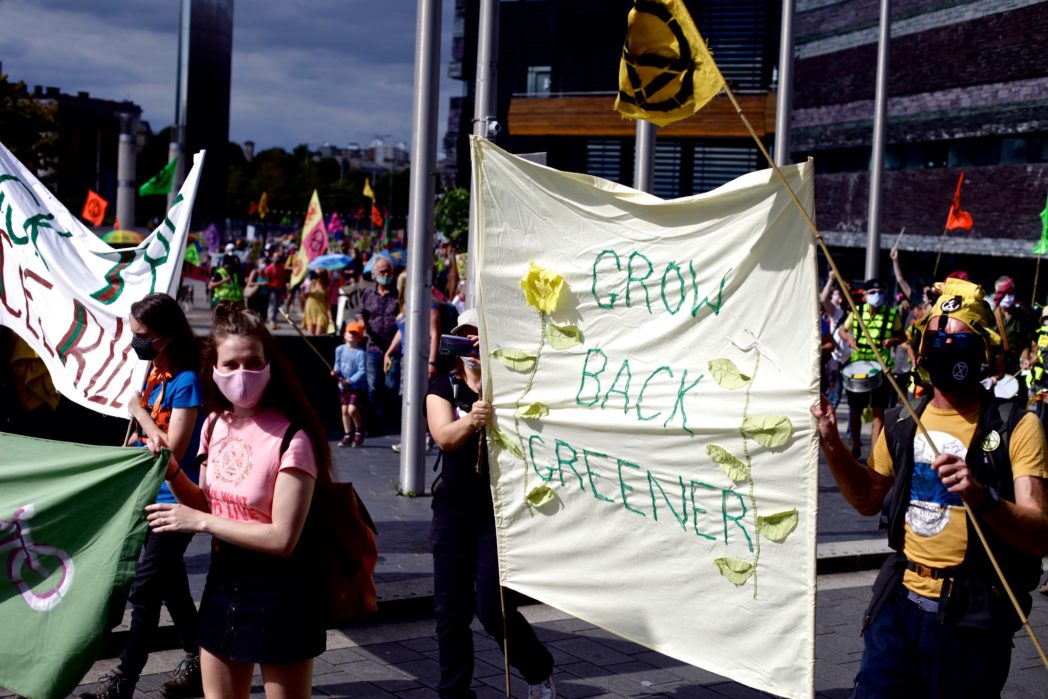Robert Minhinnick and Eamon Bourke reflect on the recent Extinction Rebellion March in Cardiff.
I’ve been involved with the green movement since 1980, when my daughter was born. This originally baffled several friends and family members. But these days almost everyone is sick to their stomachs when considering ‘the environment’. Forty years filled with crisis, alarm, denial, greenwash, hyperbole and now, frankly, horror.
I was a merchant of doom and have been proved right. That is why I support Extinction Rebellion, despite stunts such as halting a London train, which I condemn. As for interrupting the flow of newsprint (for sixteen hours one week this year) I applaud that action.
One year after the Yes Cymru Merthyr Tydfil march, Extinction Rebellion summoned another group of Welsh people to Cardiff ‘s magnificent Bute Park. This time there were three hundred, not four thousand. And we were all wearing masks. I was disappointed not more of those four thousand came on the Extinction march. What use is independence on a dead planet?
For the Merthyr march I had travelled by public transport, but with six family members on September 1st, we took cars. The reason for the Cardiff march is that scientists are now describing climate change and loss of biodiversity as catastrophic.
Who turned up in the park? Greenies, a few supporters of Yes Cymru or Plaid, some Labour activists, and the usual caring souls who attend everything.
And who are Extinction Rebellion anyway? Hippies? Middle class white settlers? Cultural invaders? All of these. But also local people, appalled at the climate emergency in their home areas, and trying to interpret a real sense of loss.
It’s important for its credibility that Extinction Rebellion concerns itself with Welsh issues. The most obvious example is the pollution incident that has occurred in the Afon Llynfi at Three Cocks (Aberllynfi), Powys. This river is a tributary of the Wye, which is undergoing serious problems itself, caused by slurry from ‘Happy Egg’ battery farms.
My grandchildren’s leisurely pace and dutiful banner carrying, and the speed of stilt walkers dressed as trees, allowed examination of the ‘new Cardiff’. We even had time for a chat with Welsh health minister, Vaughan Gething, in a Castle Street ‘eat out to help out perspex-partitioned alfresco restaurant.
From Bute Park into Bute Street and then ‘the Bay’ we passed numerous new developments, usually half-built offices. For me, these are dispiriting. So much of the new capital seems designed for an earlier time. New offices for whom? How will these future workers reach their desks? Will there be provision for home working, a concept many are discovering? I write this from Bridgend county borough, in the third week of its second lockdown.
Already the road system around Cardiff Bay is out of date, designed it seems for a north American city, thus ruled by the motor car. Also instructive were our views of the locked down headquarters of various arts organisations. If ever there was a modern image to what we have done to Wales, this is it.
The arts belong to practitioners and those who love art as life itself (Rishi Sunak please note), not bureaucrats who could never justify their salaries or rents. Yet I find this ‘arts ghetto’ close to the Wales Millennium Centre oddly inspirational. No, it’s not good enough. Thus, it must fail better. At the time I passed through, 1pm on September 1st 2020, it appeared uninhabited.
Other family members are excited by Cardiff. We all love Techniquest. But I remember the irreplaceable thrill of the Mount Stuart Hotel (now a Weatherspoon’s), the Big Windsor (soon to be apartments and shops), and the vanished Casablanca club. This is not to mention current Cardiff Bay scandals such as Victoria Wharf, where many new flats are unsaleable, due to dangerous cladding.
Yes, the Cardiff Bay rail station offers a service every twelve minutes to Queen Street. But the absence of electrification, together with the slow development of the ‘south Wales metro’ system means public transport cannot play its part in addressing the climate emergency.
I believe public transport should be entirely free. Absurd? Not even the 2019 Labour manifesto contained anything so radical, and look what happened to that. But with road traffic in early October 2020 almost reaching pre-Covid levels, it must be an option.
Our goal was the Senedd. The march was notable for its good humour and lack of political exhortation. I think it was over- policed, but noted two police horses frightened by the drums of a Bristolian samba band present from the start.
Maybe I expected the day to culminate with rhetorical flourishes. Instead it ended without celebration, unlike the Yes Cymru event, with its poetry and political optimism. Several writers also took part in the XR march. Today, we cannot write about the natural world without awareness of man-made climate change. As a writer I understand even the most minute detail of poetry is therefore politicized. This also goes for language loss and human rights.
At the Senedd, then Crickhowell House, the two children, seven and four, left their banners to be collected. My granddaughter, with her step counter, claimed the total walked was five miles by the time we returned to the park.
Since September, I’ve been working on the Sustainable Wales project, Ein Milltir Sgwar/Our Square Mile, in which ten writers from Wales, five of them ‘newcomers’, discuss their home area and its possible future. We are still hoping to celebrate it with live events, 2021/2. This also goes for our ‘Letter from the Future’ project. If the virus allows…
You might also like…
An adopted son of Newport, Ben Glover, looks at the radical political history of Wales’ third city and finds a story of rebellion, Chartism and democracy.
Robert Minhinnick is co-founder of Friends of the Earth Cymru and the charity, Sustainable Wales/Cymru Gynaliadwy. He lives in Porthcawl.
Eamon Bourke is a filmmaker and photographer. Co-author of ‘Fairground Music’ (Gomer, 2010). A founding member of ‘Friends of the Upper Wye’. He lives in Cwm Bach, Glasbury.
















